Strep throat is a bacterial infection that can cause sore and scratchy throat [1].
It is often marked by pain due to swollen tonsils, and tender and swollen lymph nodes [5].
The infection is caused by Group A Streptococcus bacteria [2].
Strep throat is highly contagious. Any close contact with an infected person can spread the disease. Left untreated, strep throat usually lasts anywhere between 2 and 5 days.
Besides some essential oils are effective in relieving strep throat symptoms at home. The therapeutic compounds of these oils include antimicrobial, anti-inflammatory, and analgesic effects. Bacteria don’t usually develop resistance against these essential oils as they do with antibiotics and other medications.
However, you should seek medical help in case the symptoms of strep throat are severe.
This article reviews the efficacy and uses of some of the best essential oils for strep throat.
How to Use Essential Oils for Strep Throat
1. Cinnamon Oil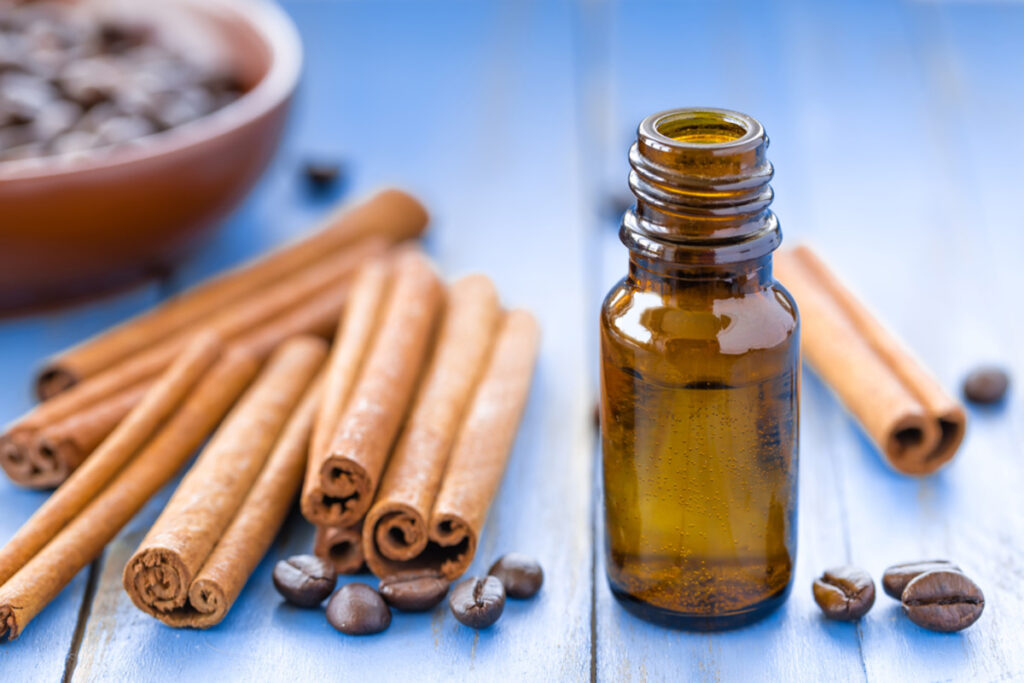
Cinnamon is not just something you need to have to add to pies and Middle Eastern dishes.
You should also keep cinnamon essential oil on hand to treat strep throat, tonsillitis, and other conditions that lead to the inflammation or irritation of the throat.
To test cinnamon’s antibacterial properties, researchers in France exposed Streptococcus pyrogens, the most common cause of tonsillitis, to different essential oils [6].
Out of the 18 essential oils used in the experiment, cinnamon was among the most potent in terms of suppressing the effects of this particular strain [6].
Cinnamon oil has also been proven to work against drug-resistant strains of bacteria [7].
Mix 2 drops of cinnamon oil and a teaspoon of honey with warm water. You can drink this solution to relieve strep throat symptoms.
RELATED: How to Use Honey and Cinnamon for Cold
2. Clove Oil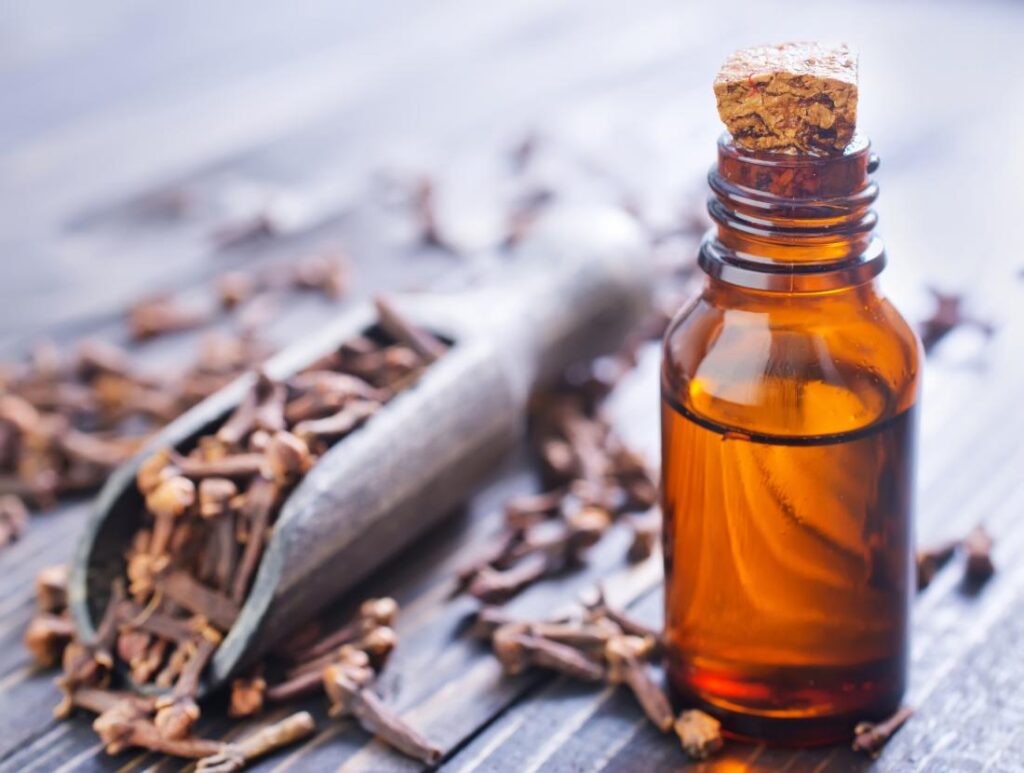
Clove is a popular ingredient in spice mixes to create hearty stews and casseroles.
However, clove is more than just the spice you use to stud your Christmas ham with.
It has anti-inflammatory, antiseptic, antifungal, and antiviral properties that make clove an effective natural remedy for strep throat, according to a 2005 study [8].
The same study found that clove oil can suppress the growth of various bacterial strains, including Streptococcus pyrogens [8].
As a result of clove oil’s ability to inhibit Streptococcus pyrogens, the infection is arrested and is kept from becoming worse [8].
Clove has even been proven effective in suppressing a type of Staphylococcus epidermis, which is normally non-pathogenic except in patients with compromised immune systems [9].
How to use clove oil steam therapy for strep throat:
- Combine 3 drops of clove oil and juniper oil each.
- Add the oil solution to a bowl of steaming warm water.
- Mix thoroughly.
- Place your head over the bucket and cover it with a towel.
- Make sure to wrap the towel over and around your head and the bowl.
- Inhale the steam for at least five minutes.
3. Eucalyptus Oil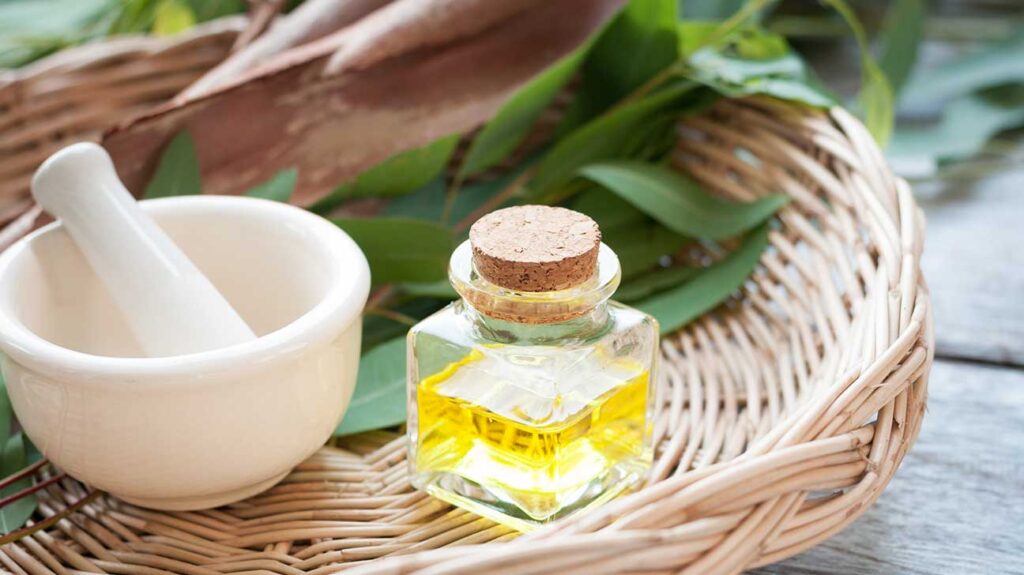
The anti-inflammatory and analgesic properties of eucalyptus oil make it good for calming swollen and painful tonsils caused by strep throat [10].
Eucalyptus oil also has antimicrobial and antiviral properties, reports a 2010 research that studied the oil’s effectiveness when taken orally or through inhalation [11].
The oil is so potent that eucalyptus doesn’t just inhibit the effects of bacteria and viruses that affect the throat and the respiratory tract, it also works against bacterial strains that are resistant to drugs [12, 13].
How to use eucalyptus oil for strep throat:
- Mix 2 drops of eucalyptus and a teaspoon of coconut oil thoroughly.
- Put the mixture onto your palm.
- Rub your hands together to warm up the oils.
- Gently massage the lymph nodes in your throat.
- Do this for at least 20 minutes or until the pain is relieved.
4. Hyssop Oil
Biblical accounts show that hyssop has been used since ancient times as it was highly prized for its role in religious rites as well as for its medicinal properties.
In fact, hyssop was used by ancient Greeks to treat throat, chest, and lung inflammation.
This practice is supported by the findings of modern-day Turkish scientists who found that hyssop can inhibit the activities of several strains of bacteria, yeasts, and fungi [14].
The researchers believe that beta-pinene, caffeic acid, isopinocamphone, pinocamphone, and tannins are the active compounds responsible for hyssop’s antibacterial and antiviral properties.
You can massage diluted hyssop oil topically to relieve strep throat.
5. Juniper Oil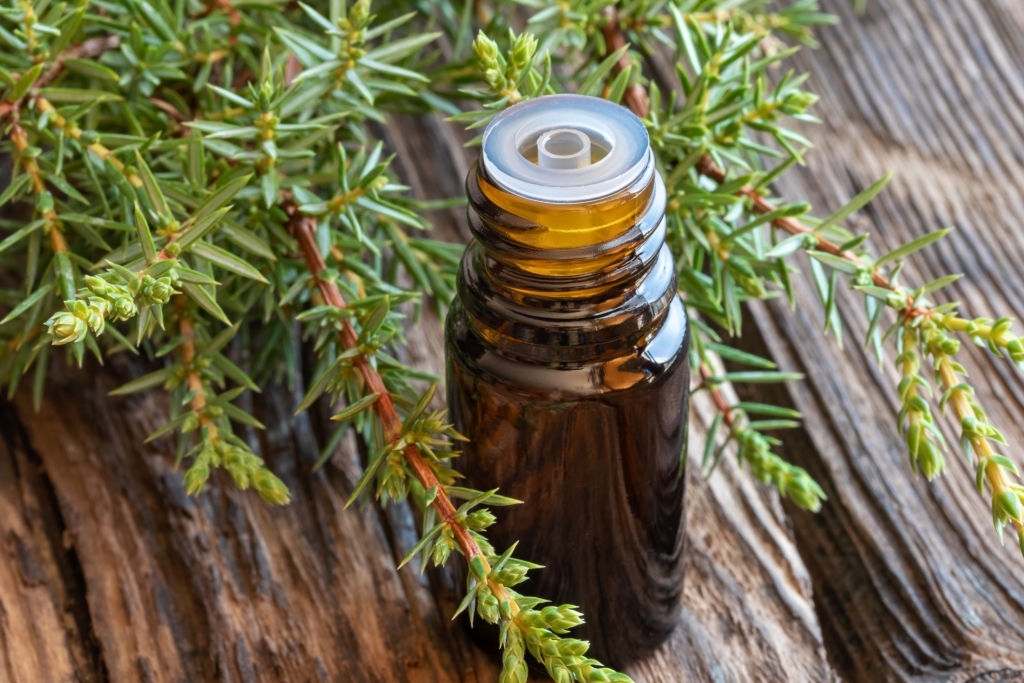
Heartburn, stomach bloating, and skin maladies are just some of the health issues that juniper berries are known to treat.
It has also been used as a natural remedy for microbial infections.
In Turkey, for instance, traditional healers use juniper berries to treat respiratory-related illnesses such as bronchitis, coughs, and colds [15].
The antibacterial properties of juniper berries are supported by the results of a 2003 study where juniper oil was found to be effective against several bacterial strains, which include drug-resistant pathogens [15].
A juniper oil steam therapy may relieve the symptoms of strep throat.
6. Lavender Oil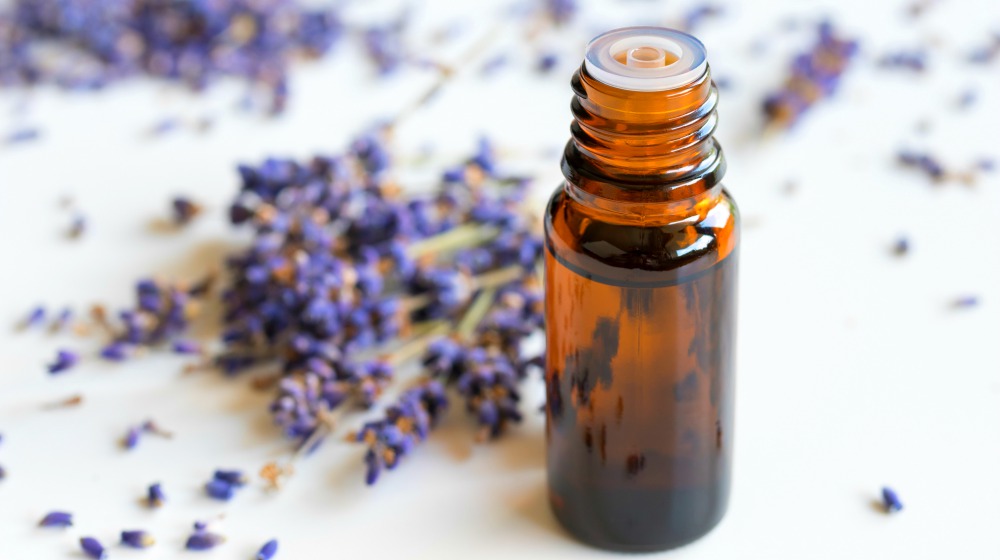
Lavender is a popular ingredient in a wide range of products, including perfumes, candles, and soaps.
It may be well-known for calming and relaxing frayed nerves, but lavender has also been used for its antimicrobial properties since World War 1 [16].
Furthermore, lavender is an analgesic and anti-inflammatory.
It is effective in treating pathogens that affect the respiratory tract so you can use it to relieve symptoms of strep throat, including soreness and irritation [17].
How to use lavender oil for strep throat:
- Mix a drop of lavender oil with a cup of warm water.
- Gargle the solution for at least 1 minute.
- Spit out the water.
- Repeat several times daily.
RELATED: 11 Health Benefits of Lavender Oil That You Should Know
7. Lemon Oil
The high vitamin content of lemon oil is responsible for its immune-boosting properties, which makes it a highly popular natural remedy for treating various conditions including colds and strep throat.
The antimicrobial properties of lemon oil have been proven in a study published in the World Journal of Microbiology and Biotechnology where researchers found that it can effectively inhibit the growth of Streptococcus mutants, a type of bacteria that significantly contributes to tooth decay [18].
In addition to being antibacterial, the anti-inflammatory, analgesic, and antioxidant properties of lemon oil also make it suitable for treating throat irritation and pain [19, 20].
One thing that sets lemon oil apart from other essential oil is that it can be taken orally.
You can add it to a glass of water or a cup of tea to instantly make a refreshing drink that you can consume whether you have strep throat or not.
8. Oregano Oil
Because of its antimicrobial and antioxidant properties, oregano oil has been widely used as a natural remedy for immune and respiratory problems [21].
Oregano’s antibacterial properties are largely due to carvacrol, which can extinguish the source of the infection, effectively treating the problem of strep throat.
The oil is so potent that you don’t need much to effectively inhibit the activities of several strains of bacteria, including Streptococcus pyrogens, Staphylococcus aureus, and Klebsiella pneumonia [22].
Oregano is especially effective against bacterial strains that are drug-resistant.
Using oregano oil in bath water is one of the effective ways to prevent strep throat infection.
9. Peppermint Oil
Peppermint has long been valued for its medicinal properties.
Today, a number of studies have been done to ascertain the antimicrobial, antiviral, and antiseptic properties of peppermint oil and these studies have had positive results so far.
Researchers of a 2013 study published in the European Journal of Dentistry found that peppermint oil is an effective intracanal antiseptic solution against oral pathogens [23].
The broad spectrum of peppermint oil’s antibacterial effects is substantiated by another study, making it an effective treatment against bacteria that causes strep throat [24].
According to the same study, the antimicrobial properties of peppermint make it ideal for treating mouth and throat irritation, such as sore throat [24].
To relieve the symptoms of a sore throat, peppermint oil may be inhaled in steam form or applied topically.
However, when using peppermint topically you need to dilute it in a carrier oil because its pure form is so potent it can irritate your skin.
RELATED: 12 Uses and Health Benefits of Peppermint Oil
10. Sage Oil
Sage is not just the perfect herb for flavoring pork dishes, it is also highly effective in bringing comfort and easing pain, according to the results of a study done by Jordanian scientists [25].
Sage also has proven strong anti-inflammatory capabilities as revealed by an experiment in 2012, which makes it an appropriate remedy for respiratory infections that include strep throat and sore throat [26].
The curative properties of sage are attributed to the carnosol, oleanolic acid, and ursolic acid it contains [26].
Home remedy for strep throat using sage oil:
- Mix 5 drops of sage oil in a bowl of steaming hot water.
- Place your face over the bowl.
- Cover your head and the bowl with the towel to trap in the vapors.
- Inhale the steam for at least 5 minutes.
11. Tea Tree Oil
Tea tree oil is one of the most well-known remedies for sore throat, a symptom of strep throat.
One reason for this is that the tea tree is a potent antimicrobial against Streptococcus pyrogens [27].
It also has the ability to calm swelling [27].
Tea tree doesn’t just relieve pain, inflammation, and other symptoms of infection, it is capable of killing the source of the infection.
Moreover, the tea tree has over a hundred bioactive components, which makes it highly effective against many types of bacteria and viruses.
RELATED: 11 Incredible Uses of Tea Tree Oil for Hair (With Directions)
12. Thyme Oil
Another immune-boosting herb, thyme is used extensively in Mediterranean cooking.
It is an excellent flavor enhancer for almost all types of dishes.
Thyme is used as a strep throat remedy since it possesses strong antimicrobial properties.
In fact, Polish researchers found that thyme effectively suppressed the activities of 120 bacterial strains that cause oral cavity and respiratory tract infections [28].
These findings were supported by another study published in 2012 [29].
Thyme’s ability to inhibit the growth and activity of bacteria has been proven to affect all strains, including drug-resistant ones [28].
Because thyme as an herb is widely used in cooking, thyme oil can also be consumed orally.
However, it is very strong so you need to dilute it first before ingesting it.
13. Thieves Essential Oil
Thieves oil blend is a powerful combination of five essential oils: clove, cinnamon, lemon, rosemary, and eucalyptus.
The therapeutic oil blend is famous for its antimicrobial and anti-inflammatory effects. In medieval Europe thieves, oil blend was a popular home remedy for all sorts of skin disorders, respiratory problems, etc.
The bacteria responsible for strep throat namely Streptococcus pyrogens, can’t stand the effects of thieves oil. The oil blend is a powerful alternative to traditional antibiotic drugs.
How to use thieves oil for relieving strep throat:
- Combine 3-4 drops of thieves oil with a tablespoon of olive oil.
- Now take some of the oil solutions on your palm.
- Rub the palm together to heat up the oil.
- Massage the lymph nodes of the throat gently for some time.
- Repeat the treatment several times daily to get rid of strep throat pain.
RELATED: 15+ Fascinating Uses & Benefits of Thieves Oil + Directions
When to See a Doctor
While strep throat is most common in children, it can affect people at any age [1].
If you suspect you or your child has strep throat, these are signs and symptoms to watch out for:
- Sudden onset of sore throat
- Pain that accompanies swallowing
- Soft and hard palate showing tiny red spots
- Tonsils that are swollen and red, with streaks of pus or white patches
- Fever
- Headache
- Rash
- Body aches
- Vomiting or nausea, particularly in small children [1]
Even so, the presence of these symptoms does not automatically signal strep throat.
Other illnesses, such as viral infection have similar manifestations.
If cold symptoms like sneezing, runny or stuffy nose, and coughing accompany the sore throat, it’s unlikely that you have strep throat [3].
Consult a doctor if the above-mentioned symptoms persist for more than 5 days.
To make sure that the condition is indeed strep throat, your doctor will have to check specifically for the infection [1]. Strep throat is diagnosed by means of throat culture [5].
READ MORE: 18 Essential Oils for Sore Throat and How to Use Them






